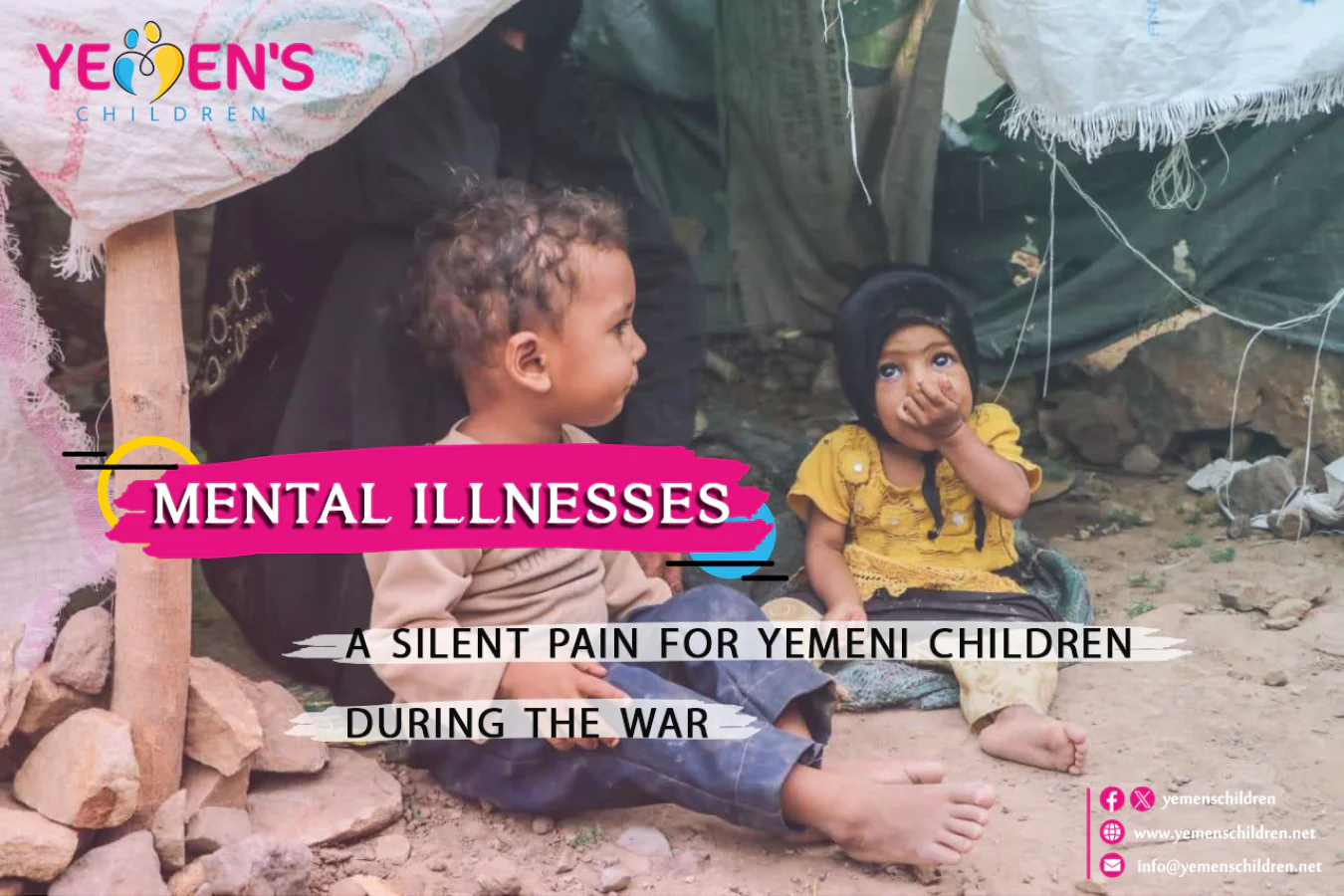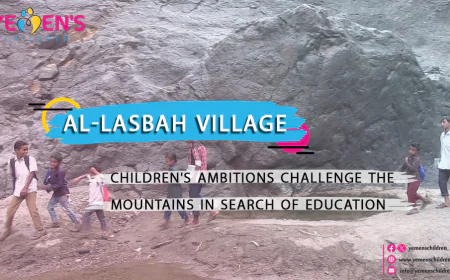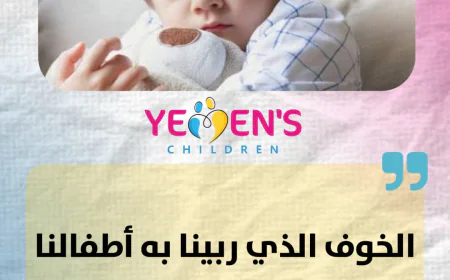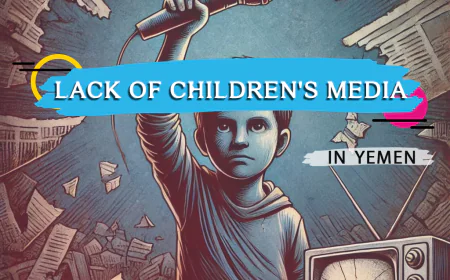Mental illnesses.. a silent pain for Yemeni children during the war

Yemen Children Platform - Salah Al-Wasai
There is no doubt that the outbreak of war in Yemen ten years ago has affected the mental health of all age groups, but it has affected children more severely, which raises the question: How much does this war affect the psychological state of children? Are there efforts made by local authorities or international and community organizations to address this phenomenon?
Jiaz Al-Samai, a Yemeni citizen who lives with his children in areas close to the contact lines in the city of Taiz, tells his suffering to the Yemeni Children's Platform: "I see many effects on my child while he sleeps, and in the afternoon I find him crying and screaming with delirium and crying most nights, so I calm him down and reassure him and give him some sweets and toys to return to his normal state, but panic and fear continue to accompany him constantly, and despite the truce that Yemen is experiencing in 2022, the events are still stuck in his mind."
Lack of psychological support
Despite the psychological suffering experienced by Yemeni children, there are few specialized initiatives in the field of psychological support, especially those concerned with children, as Yemeni writer Salman Al-Hamidi says: "In all of Yemen, we have only 45 psychiatrists. The United Nations says in statistics that nearly a third of the Yemeni people need psychological care."
Al-Hamidi adds: "Imagine this is the psychological situation in Yemen, poor, and the capabilities are scarce, and we do not have pediatricians specializing in mental health."
Director of the Elixir Childhood Platform "Aya Khaled" tells the Yemeni Children's Platform: "I receive between seven and eight psychological consultations daily from families seeking to help their children, and she goes on to say that some families hesitate to resort to psychiatrists for fear of the impact of future medications on their children."
Khaled, who is the director of the only platform in Yemen specialized in providing psychological support services for children, expressed her hope to establish specialized centers for psychological support for children in Yemen, stressing the importance of early intervention in cases of any psychological symptoms appearing in children to ensure that the necessary support is provided quickly and efficiently.
Mohammed Al-Itali, a psychologist and director of the Oxygen Center for Psychological Support in Aden, told the "Children of Yemen" platform that estimates indicate that 22% of communities affected by conflicts suffer from psychological problems, noting that children are the most psychologically affected group in conflict areas.
Al-Itali explained that children do not have a broad linguistic dictionary to express their suffering, which causes the effects of trauma to appear in the form of changes in personality and psychological and emotional development.
Al-Itali pointed to a number of warning signs that may indicate that children are psychologically affected, including sleep disorders, such as insomnia or nightmares, involuntary urination during sleep, stuttering and difficulty speaking, a decline in concentration and understanding, or a tendency to daydream, excessive fear, aggressive behavior, or social isolation.
Samar Al-Qahtan, a pediatrician, says that children who are exposed to trauma may suffer from physical symptoms in addition to psychological symptoms such as headaches, nausea, abdominal pain, and diarrhea, noting that these symptoms may appear days or weeks after exposure to the trauma.
According to a study by the Sana'a Center for Studies in 2017, children in Sana'a, Aden, Taiz, and Abyan are increasingly suffering from feelings of fear, insecurity, anxiety, and anger.
The study also indicated that 31% of Yemeni children suffer from physical symptoms, such as headaches, chest and abdominal pain, and fatigue, which were considered signs of psychological distress, 5% of children suffer from bedwetting, 2% have returned to stuttering, 47% suffer from sleep disorders, and 24% suffer from difficulty concentrating and panic attacks.
The Italian pointed out that providing safe spaces for children is one of the most important psychological interventions required by the state and the Ministry of Health, and social workers can detect affected cases and refer them to psychological specialists for follow-up treatment.
Samira Qahtan mentioned preventive steps to protect children psychologically during war, calling on the parties to the conflict to avoid targeting children, encourage children to express their feelings freely, allow children to cry when needed, avoid exposing them to violent or harsh scenes, and organize psychological rehabilitation sessions that include breathing exercises, drawing, and reading stories, and communicating with children clearly about events in a manner appropriate to their age and understanding.
Qahtan also called for the need to provide emotional support for them and provide a safe and stable shelter, and reduce tension at home by keeping the parents calm and steadfast, reducing the use of violent news and images, maintaining a daily routine and organizing fun activities, and promoting a healthy lifestyle, such as good sleep and exercise, and developing the spiritual side of children, such as supplication and prayer.
This is confirmed by the citizen "Jiaz Al-Samai", we feel helpless to avoid and treat the effects of war on our children's souls as a result of the difficult living conditions, the deterioration of the economy, and the lack of livelihoods, as we were forced to live and adapt in an environment surrounded by dangers and without protection for us and our children.
Al-Samai adds: "Despite all these fears, we have not seen any significant intervention by government authorities or non-governmental organizations that specialize in supporting childhood and children's rights in order to provide moral support and medical care."
On the government side, Ali Al-Hajj, the coordinator of the National Mental Health Program in Taiz Governorate, told the "Yemeni Children's Platform" that there are no accurate statistics on the number of children who have been psychologically exposed to the war, stressing that there is a percentage ranging between 5-10% of children who need psychological support from a non-specialized center, while 3-5% need specialized mental health services.
Al-Hajj confirmed that the Health and Population Office, in partnership with the Social Affairs Office and with funding from UNICEF, has implemented psychological protection and support programs for children since 2016 in the liberated areas of Taiz. These programs included mobile and fixed friendly spaces and health centers, but they were not sufficient to cover the needs in the entire city, according to him.
He added that there is a shortage of trained and qualified health personnel in the field of mental health, and a lack of investments directed to support this sector, especially in qualifying human cadres, and a scarcity of financial support allocated to mental health programs in general.
Reports
According to a World Health Organization report, the number of people affected by psychological trauma and stress resulting from the ongoing conflict in Yemen is estimated at about 7 million People, equivalent to a quarter of the population. However, less than 120,000 people are able to receive ongoing psychological support.
A study issued by the Sana'a Center for Studies entitled "The Impact of War on Mental Health in Yemen: A Neglected Crisis" (2017) indicated that children under the age of fourteen constitute 44% of the Yemeni population, making them the group most affected by the effects of war. According to statistics, there are about two million children deprived of education, in addition to 462,000 children suffering from severe malnutrition, and about 1,500 children recruited into armed conflicts.











